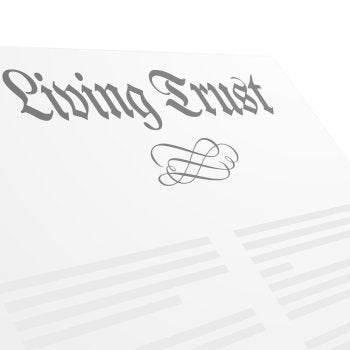-
Exploring the Differences Between a Living Trust and a Will
 Many people are familiar with the last will and testament, which is a signed legal document that establishes how a person’s property is to be divided upon his or her death. Wills also serve to designate a guardian for minor children. Drafting wills near Tracy and Manteca may be done at any point in a person’s lifetime–not necessarily only when a person is of advanced age or has a serious illness. Wills can be amended at any time that the individual wishes. However, wills are not the only component of the estate planning process.
Many people are familiar with the last will and testament, which is a signed legal document that establishes how a person’s property is to be divided upon his or her death. Wills also serve to designate a guardian for minor children. Drafting wills near Tracy and Manteca may be done at any point in a person’s lifetime–not necessarily only when a person is of advanced age or has a serious illness. Wills can be amended at any time that the individual wishes. However, wills are not the only component of the estate planning process.Lawyers who specialize in estate planning can also help clients establish living trusts. As the term suggests, these structures govern property management during a person’s lifetime, as well as after the person’s death. Some people choose to establish a living trust because it can bypass probate of assets and prevent information about financial assets from becoming publicly accessible. A person can be named as the trustee of his or her own living trust. Upon becoming incapacitated or dying, a successor trustee takes over these responsibilities.
-
Who Has the Right to Pursue a Wrongful Death Case?
After losing a loved one in an accident, you may choose to consult an accident attorney about your legal rights and options. If your loved one’s death can be attributed to the neglectful or reckless actions of another party, you may be able to file a wrongful death lawsuit against that person. As your attorney can explain to you, a wrongful death lawsuit is a civil action, which is not the same as criminal charges such as manslaughter. An attorney in Tracy or Manteca can evaluate your case and your relationship to the decedent. The rules regarding which individuals may be eligible to pursue a wrongful death case vary from state to state.

Family Members and Partners
Your attorney may file a wrongful death lawsuit on your behalf if you are an immediate family member of the decedent. Under California law, this is defined as the decedent’s surviving spouse and surviving children. The decedent’s domestic partner may also file a wrongful death lawsuit. These individuals essentially have the first right to file a wrongful death claim. If there are no surviving individuals in the decedent’s line of descent, then other individuals may be eligible to bring a claim.
Extended Family Members
Assuming that the first category of individuals is no longer living, the state of California allows extended family members to file a claim. Specifically, these include any individuals who would be beneficiaries of the decedent’s property in accordance with the state of California’s laws of intestate succession. This category would typically include the surviving parents of the decedent or the decedent’s surviving siblings.
Financial Dependents
Even if you do not fit into either of the above categories, you can still consult an attorney if you lost a loved one because of the actions of another person. You may be eligible to bring a claim against the responsible party if you can prove that you were a financial dependent of the decedent. This may apply if you were the decedent’s putative spouse or child of a putative spouse. Other financial dependents may include the decedent’s stepchildren and parents.
-
What Are the Top Mistakes Made in Estate Planning?
Have you visited an estate planning attorney near Tracy or Livermore yet? If not, you’re already making one of the most common mistakes in estate planning, which is to delay the process of creating your will and making other key decisions for your estate. Even if you aren’t yet sure whether you need a trust or a living will, it’s a good idea to visit an estate planning lawyer to learn about your options.
To hear about three additional common mistakes in estate planning, watch this video. These financial experts offer some points of consideration for you to discuss with your will lawyer, such as whether your beneficiary forms are properly updated and whether you have planned for minimal estate taxes.
-
A Look at Common Mistakes People Make in Wills
 Establishing a will is an important step for everybody, but one simple mistake can prevent your final wishes from being carried out. Fortunately, it’s easy to avoid these mistakes—as long as you know what to expect. Working with an estate planning attorney near Tracy can help you steer clear of these common will errors:
Establishing a will is an important step for everybody, but one simple mistake can prevent your final wishes from being carried out. Fortunately, it’s easy to avoid these mistakes—as long as you know what to expect. Working with an estate planning attorney near Tracy can help you steer clear of these common will errors:Neglecting to include all of your property. If asked to name everything they own, most people would probably forget to include a few things. If your will does not include a residuary clause and you do not list everything you own, your will is considered incomplete and your remaining assets will be disposed of by the state. Meeting with a will attorney will help you ensure that all of your assets are accounted for and that nothing is overlooked.
Failing to appoint the right executor. Choosing an executor to administer your estate is one of the most important aspects of drawing up a will, so make sure that you select a trustworthy individual. In the event that your executor is no longer the best person for the task, you will need to alter your will and select a new executor.
Forgetting about estate taxes. When drawing up a will, many people neglect to take estate taxes into account. While you may assume that your estate is not worth enough to be taxed, you should still talk to a will attorney to determine which of your assets are taxable. Estate tax laws change from time to time, so an attorney can ensure that you are kept up to date on the current regulations.
Include all beneficiaries. Before you establish your will, you should take some time to determine who your beneficiaries will be. While you can change your will later, for the sake of convenience it’s best to decide who you wish to include. Generally, you should not have witnesses who are named as beneficiaries in your will.
Failing to update after major life changes. If you have gotten married or divorced, welcomed a child into your family, moved, or started a business, that change should be incorporated into your will. It’s easy to put off these adjustments, but the sooner you change your will, the sooner you will have peace of mind.
-
Answers to Your Questions About Writing a Will
 There are many factors to consider when writing a last will and testament. Before you meet with a lawyer to discuss estate planning near Tracy and Livermore, you should write a list of your assets and consider which beneficiaries you wish to leave them to after your passing. You may also wish to write a list of questions you have for your estate planning lawyer ; he or she is your best source of information regarding estate administration.
There are many factors to consider when writing a last will and testament. Before you meet with a lawyer to discuss estate planning near Tracy and Livermore, you should write a list of your assets and consider which beneficiaries you wish to leave them to after your passing. You may also wish to write a list of questions you have for your estate planning lawyer ; he or she is your best source of information regarding estate administration.Do I Need a Will?
If you are a legal adult, it might be a good idea for you to have a will even if you do not yet have significant assets. Should something happen to you and you pass away without a will, this is known as dying intestate. In this case, your state’s intestate succession laws will dictate who will inherit your property. This may not be in accordance with your preferences. If you have a minor child and you die without a will–and if the other parent cannot care for the child–then the state will designate a guardian for your child . The state’s laws will also determine which property the child can inherit.
What Elements Are Necessary for Legal Validity?
The laws of estate planning vary from state to state; however, most wills must have certain elements to be legally valid. For example, you must be at least 18 years old and you must be of sound mind. The will must contain at least one provision for the guardianship of minor children or for the distribution of property. It must appoint an executor and it must state specifically that the document is the testator’s will. Additionally, you and two witnesses must sign the document.
Shouldn’t My Spouse and I Have a Joint Will?
If you and your spouse file a joint tax return, you might assume that it makes sense to have a joint will. But in fact, this is almost never a good idea, since it’s unlikely that you and your spouse will pass away at the same time. Additionally, you or your spouse may have property that is held individually, rather than jointly.
-
Discussing Your Estate Plan with Your Family
The passing of a family member is a difficult event to cope with, but it can be even more challenging when the surviving family members begin to disagree about the decedent’s assets. If you’ve met with an estate planning attorney near Tracy or Manteca, you’ve already taken an important step toward providing for your loved ones and preserving familial harmony. To ensure that all family members clearly understand what your wishes are, you may decide to call a family meeting to discuss your estate planning decisions.
Get Your Paperwork Notarized Beforehand
Your preferences regarding the distribution of your assets or the succession of your family business are your decisions alone. While you may decide to consider other family members’ feedback, you should make it clear that you have the final say. This may prevent some arguments among family members. To send a clear message that you’ve already made your decision, have your estate planning attorney finish drawing up the documents and get them notarized before you sit down with your family.Consider Using a Neutral Facilitator
 If you feel that your estate planning decisions may create some discord or confusion, it may be a good idea to ask your lawyer to serve as aneutral facilitator for the discussion. You may even choose to hold the family meeting at your lawyer’s office to establish a professional ambience for the discussion. Your estate planning attorney can answer your family’s questions about various aspects of your will, trust, and similar matters.
If you feel that your estate planning decisions may create some discord or confusion, it may be a good idea to ask your lawyer to serve as aneutral facilitator for the discussion. You may even choose to hold the family meeting at your lawyer’s office to establish a professional ambience for the discussion. Your estate planning attorney can answer your family’s questions about various aspects of your will, trust, and similar matters.Avoid Making Emotional Decisions
Designating an executor, trustee, guardian, healthcare proxy, and financial power of attorney may involve making difficult decisions. It’s advisable to try to leave emotions and family attachments out of these decisions. Instead, carefully consider which person would be best able to handle these important roles. Remember that you can designate a non-family member. By avoiding making emotional decisions, you can explain your reasoning to your family members without upsetting anyone. For example, you might designate one of your daughters as a healthcare proxy because she is a registered nurse, instead of assigning that role to your sibling. -
Understanding the Basics of Estate Planning
Far too many people die intestate, which means they pass on without a will. When this happens, their assets are dealt with in accordance with state intestate succession laws. In some cases, when an heir cannot be identified, it is possible for the state to claim these assets. You can easily avoid these problems by consulting an estate planning lawyer in Tracy or Livermore. Your estate planning attorney will carefully review your finances, offer sound recommendations, and provide you with all the information you need to make wise decisions for your heirs.
Will
 A last will and testament is a crucial document to have, regardless of your health or age. As your circumstances change, you may wish to visit your lawyer to have your will revised. For example, if you have more children or if grandchildren are born, you may wish to adjust your will to reflect your new inheritance preferences. Your lawyer will draft your will for you to ensure that your assets are distributed in accordance with your wishes after you pass on. Your will can be as detailed as you like. For example, some people simply prefer to leave all their assets to their spouse, while others prefer to designate heirs for specific items. You might leave a valuable jewelry collection to a granddaughter, for example, and leave a vehicle to a sibling. You can alsouse your will to leave gifts for your favorite charities. For parents and legal custodians, having a properly drafted will is particularly important. Your will can designate a guardian for any children who are still minors when you pass on. If you take care of someone who is mentally or physically incapacitated, you will also need to designate a guardian for that individual.
A last will and testament is a crucial document to have, regardless of your health or age. As your circumstances change, you may wish to visit your lawyer to have your will revised. For example, if you have more children or if grandchildren are born, you may wish to adjust your will to reflect your new inheritance preferences. Your lawyer will draft your will for you to ensure that your assets are distributed in accordance with your wishes after you pass on. Your will can be as detailed as you like. For example, some people simply prefer to leave all their assets to their spouse, while others prefer to designate heirs for specific items. You might leave a valuable jewelry collection to a granddaughter, for example, and leave a vehicle to a sibling. You can alsouse your will to leave gifts for your favorite charities. For parents and legal custodians, having a properly drafted will is particularly important. Your will can designate a guardian for any children who are still minors when you pass on. If you take care of someone who is mentally or physically incapacitated, you will also need to designate a guardian for that individual.Trust
Another basic component of estate planning is creating trusts. A living trust goes into effect during your lifetime, while a testamentary trust goes into effect after your death. You can transfer certain assets to a trust to protect them and reduce the tax burden. Trusts allow for the speedy distribution of assets to beneficiaries after a death. They may also place limitations on inheritances. -
Personal Injury Cases: What Are Your Damages?
 When you suffer harm because of another party’s negligent actions, you should make yourself aware of your legal options as soon as possible. If you are bringing a lawsuit in the aftermath of an injury, you may be wondering how personal injury damages are defined. As your injury lawyer in Tracy can explain to you, the compensation you will seek in your case depends on the nature of your injuries. These are the most common categories of damages in personal injury cases:
When you suffer harm because of another party’s negligent actions, you should make yourself aware of your legal options as soon as possible. If you are bringing a lawsuit in the aftermath of an injury, you may be wondering how personal injury damages are defined. As your injury lawyer in Tracy can explain to you, the compensation you will seek in your case depends on the nature of your injuries. These are the most common categories of damages in personal injury cases:Health expenses. The party responsible for your injury should also be responsible for paying for your medical care. If you have been injured as a result of someone else’s negligence, you are entitled to compensation for all of your medical expenses, including hospital bills, physical therapy costs, home nursing care, medication bills, and transportation costs.
Lost wages. Oftentimes, an individual who has been injured will need to miss work—and thus lose out on potential earnings. You can seek compensation for lost wages or income, including loss of vacation days or sick time. In the event that you have been permanently disabled and prevented from returning to your job, you can sue for loss of your lifetime wages.
Pain and suffering. After an injury, you may have to endure a lengthy recovery period. You are entitled to compensation for the suffering you experience, including chronic pain and the amount of time it takes you to recover from your injury. Be sure to document your recovery, and save all of your doctor’s bills and other medical records.
Wrongful death. In the event that a loved one has died as a result of someone’s negligent actions, you may be entitled to sue for damages. The rules governing wrongful death lawsuits vary from state to state, so you should speak to a personal injury attorney as soon as possible to determine whether you have standing to sue.
-
Estate Planning and Taxes
 For affluent Americans, the federal estate tax has long been a matter of significant concern. Just a decade ago, estates valued at $1.5 million or higher could be subjected to a federal estate tax of nearly 50 percent. The same applied to gift taxes made while the individual was alive. When they handled estate planning matters, couples often had to establish trusts to take advantage of the estate tax exemption. To make estate planning near Tracy and Manteca even more challenging, the federal estate tax fluctuated from year to year in a highly unpredictable manner.
For affluent Americans, the federal estate tax has long been a matter of significant concern. Just a decade ago, estates valued at $1.5 million or higher could be subjected to a federal estate tax of nearly 50 percent. The same applied to gift taxes made while the individual was alive. When they handled estate planning matters, couples often had to establish trusts to take advantage of the estate tax exemption. To make estate planning near Tracy and Manteca even more challenging, the federal estate tax fluctuated from year to year in a highly unpredictable manner.Recently, however, Congress made a few changes that may make estate planning a little easier for many. The highest federal estate tax rate is now firmly set at 40 percent. Additionally, the estate tax exemption was raised to five million dollars per person, which is adjusted for inflation yearly. Rules regarding trusts have also been relaxed. To take full advantage of these changes, individuals can turn to an estate planning lawyer for guidance.
-
Reasons to Have an Advance Health Care Directive
Many people make the mistake of thinking that serious accidents or injuries are not likely to happen to them, which can prevent important steps in planning for the future. Regardless of your age or current state of health, it is beneficial to have an advance health care directive in place so that your wishes are met should you become unable to make decisions about your own care.
As this video explains, an advance health care directive will allow you to state your wishes about future medical care and give a loved one the legal right to make decisions on your behalf when it comes to life-sustaining treatment. Speaking with your doctor and an experienced estate planning lawyer will allow you to create a directive that is best for your needs and beliefs.
RECENT POSTS
categories
- Uncategorized
- Personal Injury
- Estate Planning
- customer reviews
- Financial Planning
- Work Injury
- Tracy Lawyer
- Attorney
- Dog Bites
- Auto Accident
- Slip and Fall
- Car Accident
- Living Trusts
- Trust Administration
- Living Will
- Wrongful Death
- Probate
- advanced health care directive
- About Us
- Russian linguist
- Infographic
- Wills and Trusts
- Will
- Car Crash
- Executor
- Whiplash Injuries
- Estate Taxes
- Slip and Fall Injury
- Auto Accident Claims
- Intestate Succession
- Disinheritance
- Trust Administrators
- Cycle Accident
